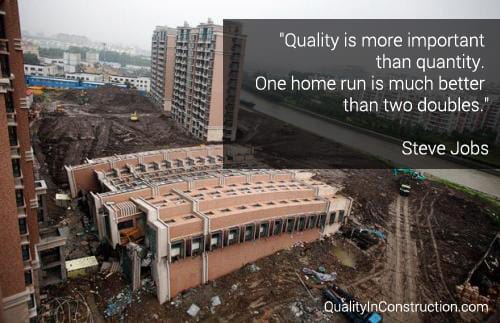
In the 60′s and 70′s, there has been a real revolution in the mass production of products like cars with the introduction of Lean Quality Management (or Total Quality Management – TQM). Toyota famously led the way on that.
What was the concept behind it?
You may do mistakes but when you do them, try to learn something from these, so you don’t do them again! As simple as that…
So…when there is a faulty break in a car that came out of the production line, there is no point of just replacing that break with a new one.
Get Your Free ITP Template
Download the Inspection & Test Plan Template that has been used across 1000's of construction projects all over the world.
You had to find why it came out as a faulty one, otherwise more faulty brakes would come out of the line.
The revolution that the Japanese introduced was that the whole production line had to stop, the team who was responsible for that break analysed what went wrong and had to find a solution in order to avoid that mistake again.
They were probably losing some hours of production but the long term benefit from not having any more faulty items at the end of the line, was what made the difference.
This is pretty easy to apply when there is a “production line”, repetitive jobs, identical products to be manufactured and possibly long-term planning and commitment to improvement.
Deming has simply put it as :
“Long-term commitment to new learning and new philosophy is required of any management that seeks transformation.”
Alright then…a Construction Project usually lasts only for some years…maybe even months in some cases and there are no direct customers that need to be satisfied.
There is only ONE customer in most of the cases.
Is there really any point of long term planning in a short-term and quick Project oriented industry as Construction industry?
And if there is any point finally, how are we supposed to implement tools that have been invented for other industries?
With so much pressure to finish a Project on time and on budget, there is really no time for learning from our mistakes nowadays.
So in Construction industry you actually have to build it “Right First time”.
But how do you do that…?
“Right First Time” is a phrase that people in Construction keep on using and declare commitment to.
It’s actually like stating: “I don’t do any mistakes. I am perfect. I have to be perfect.”
So, hang on… Are we literally asking from the people on and off-site to be perfect?
Who are they finally? Gods…?
There is no argument that this should be the ultimate goal, but trying to build something that has never been built before (and that is because every project is unique) without any mistakes, it’s a task that has never happened in human history and probably it will never happen. Ask the Pharaohs or Ictinus.
The thing is that we have to accept the fact that there will be mistakes, there will be NCRs and we have to be there to find solutions.
But in the same time we must learn how to be efficient and improve our internal processes project by project, day by day.
So, what is “Quality” in the Construction industry and what should we try to achieve after all?
The ultimate answer is simple: we should strive to make our Clients happy and keep the most collaborative culture possible!
In construction industry this is quite straight forward in most of the cases and it can literally be summarised in 4 bullets:
- safe
- on time
- on budget
- with no defects
(we can probably add one more bullet here regarding sustainability compliance)
So, “Quality” in Construction shouldn’t just be all about taking concrete cubes, opening/closing NCRs or adding paperwork and bureaucracy for the already busy Engineers on site.
(Don’t get me wrong…these are definitely needed and must be in place!)
Also, Quality Management shouldn’t be something that we do on top of other things or because we have to, or our Contract says so.
Quality In Construction should be about proper planning, budgeting, risk analysis, compliance, continuous improvement and building excellent relationships with all Stakeholders on a daily basis, while refining our processes to produce the most efficient and well-engineered projects possible, in a collaborative and ethical environment.
(that was a mouthful!)
At the end of the day, this is what creates a sustainable and ethical business and literally changes the lives of everyone involved in such a project or organization.